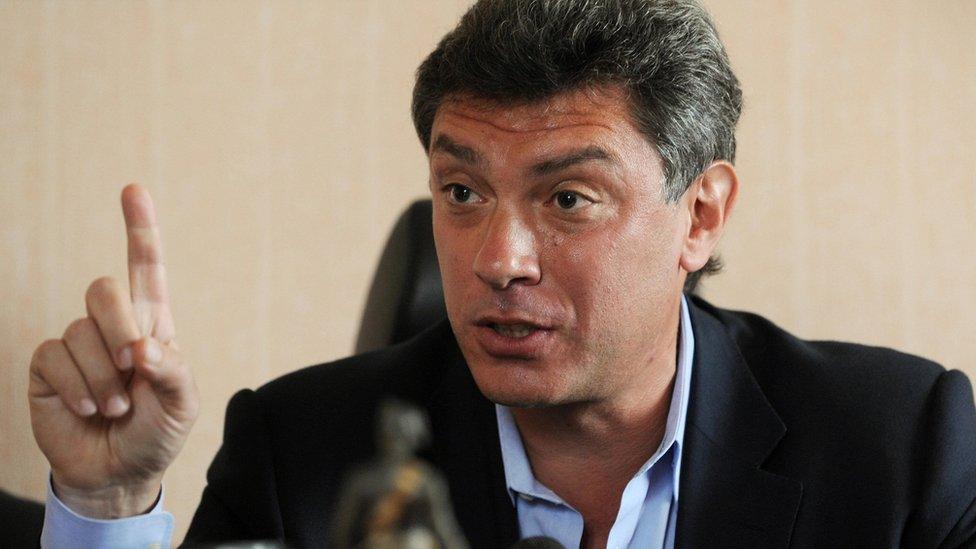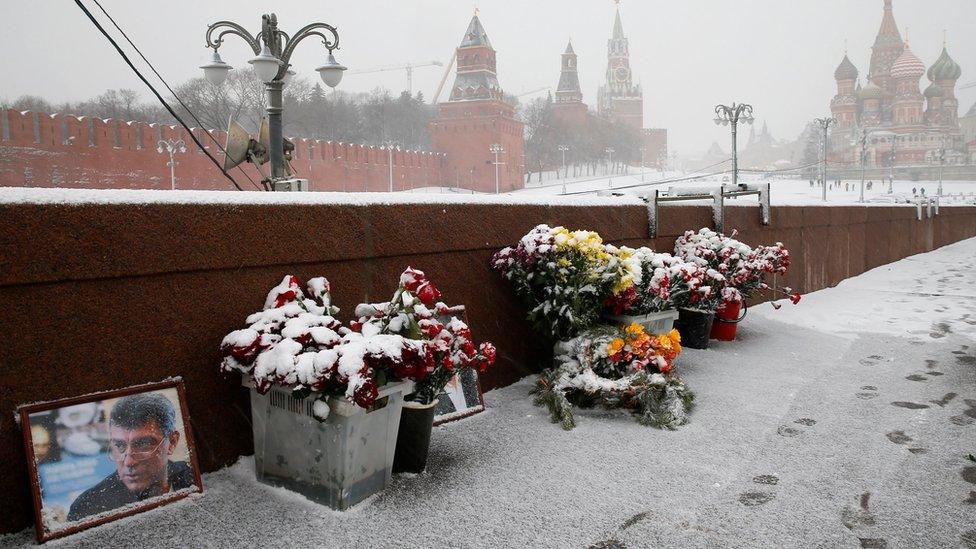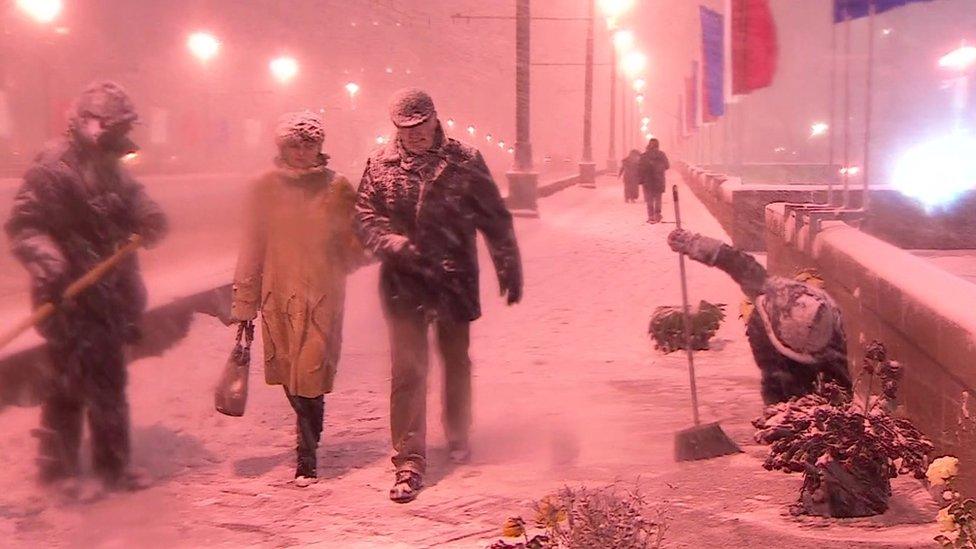Boris Nemtsov killing: Grief, fear and anger one year on
- Published
Keeping Nemtsov's memory alive
For the past year, supporters of Boris Nemtsov have been keeping guard at a shrine on the spot beside the Kremlin where he was murdered.
They brave the elements 24 hours a day to protect the memorial from nationalists who have vandalised it, denouncing the opposition politician as a traitor.
The pictures and candles have also been swept away by city cleaners in the dead of night after police detained those standing guard.
"They're still battling Nemtsov after his death," Nadir said this week, brushing snow from bunches of flowers with a paint brush.
"But it's no use," the activist believes. "People just bring more flowers, more photos and more icons."
Boris Nemtsov was shot in the back as he walked home late at night last 27 February in a killing that shocked Russia.
His political allies believe it was meant to terrify them into silence.
A former deputy prime minister once mooted as a successor to President Yeltsin, Mr Nemtsov was a reformer and a democrat who became fiercely critical of Vladimir Putin.

Mr Nemtsov was a prominent and outspoken critic of President Putin
On what was to be his last night alive he had been at the liberal radio station Ekho Moskvy, calling on listeners to join a protest rally that weekend.
In typically feisty form, he accused Russia's president of launching an illegal war with Ukraine, prompting Western sanctions and an economic crisis.
Certain that his murder was politically motivated, Boris Nemtsov's family and friends argue the official investigation does not dig deep enough.
Five men from Chechnya were captured quickly and face trial later this year as the suspected contract killers.
"But what about those who organised the murder and promised the money?" the lawyer for Boris Nemtsov's family, Vadim Prokhorov, wants to know.
The accused have ties to people in the inner circle of Chechnya's strongman leader, Ramzan Kadyrov, and the lawyer wants them questioned.
Instead, investigators have identified the driver of an interior ministry battalion deputy commander as the supposed mastermind of the murder - but he has vanished without trace.
His supposed motive and access to funds are unclear.

The site where he was killed has become a shrine
"It means real steps to the inner circle of Ramzan Kadyrov were blocked," Mr Prokhorov argues, fearing a cover-up.
The Chechen leader himself has denied any link to the killing, suggesting Mr Nemtsov's allies look closer to home.
Meanwhile, the self-declared "loyal foot soldier" of President Putin has taken to social media to denounce Kremlin critics as jackals and traitors.
In January, Mr Kadyrov posted a video of one of Boris Nemtsov's closest allies in the sights of a gun. The target, Mikhail Kasyanov, took it as a direct death threat.
Not long after, a man slammed a cake into his face in a restaurant yelling that he was the "shame of Russia".
"There are a lot of changes [since Nemtsov died]. But all to the worse. The threats are growing," Mr Kasyanov told the BBC, linking the rising tensions to the approach of parliamentary elections in autumn.
"The problems in the economy help people see Russia is heading in the wrong direction.
"That's why the authorities are so nervous and angry, and encourage these hooligans to prevent our activity," he argues.
Zhanna Nemtsova: "He was a figure Putin very much disliked"
Earlier this month, Mikhail Kasyanov was forced to break off a campaigning trip to Nizhny Novgorod after he says his colleagues were attacked and threatened.
The next day, nationalist groups rallied outside the hotel where he was due to appear.
"Go to the USA or Brussels. That's where they pay you!" a bearded speaker urged Mr Kasyanov, addressing the small, flag-wielding crowd.
Other slogans called for ideological enemies to be purged and the crowd chanted 1-9-3-7, the year that Stalin's Great Terror reached its height.
"We are sure the West wants a revolution here but we won't let it happen," one speaker insisted. "Our country backs Vladimir Putin!"
"Of course I'm worried," Mikhail Kasyanov admitted, after his early return to Moscow. "People don't feel secure at all."
Whoever pulled the trigger, or paid for his murder, Boris Nemtsov's supporters also blame the climate of hate they say has built up here.

Mr Nemtsov's supporters guard the shrine, as it has been vandalised several times
They date its roots to Russia's 2014 annexation of Crimea and the patriotic fervour whipped up in its wake. Critics of that policy were viewed as traitors.
Zhanna Nemtsova remembers warning her father that it was a dangerous moment.
"I told him we probably should leave and he said we should wait. He was very optimistic," the politician's daughter recalls.
"He told me one day he could be in prison, he was ready for that. But he wasn't ready for death at all," she added.
Three months after her father's murder, Zhanna left Russia for her own safety. She has now begun her own battle from abroad, for justice.
"I think I owe it to my father, I think it's my mission to have this investigation and I think it's important for Russia," Zhanna told the BBC.
"Because if there is no resistance, then these awful things will go on."